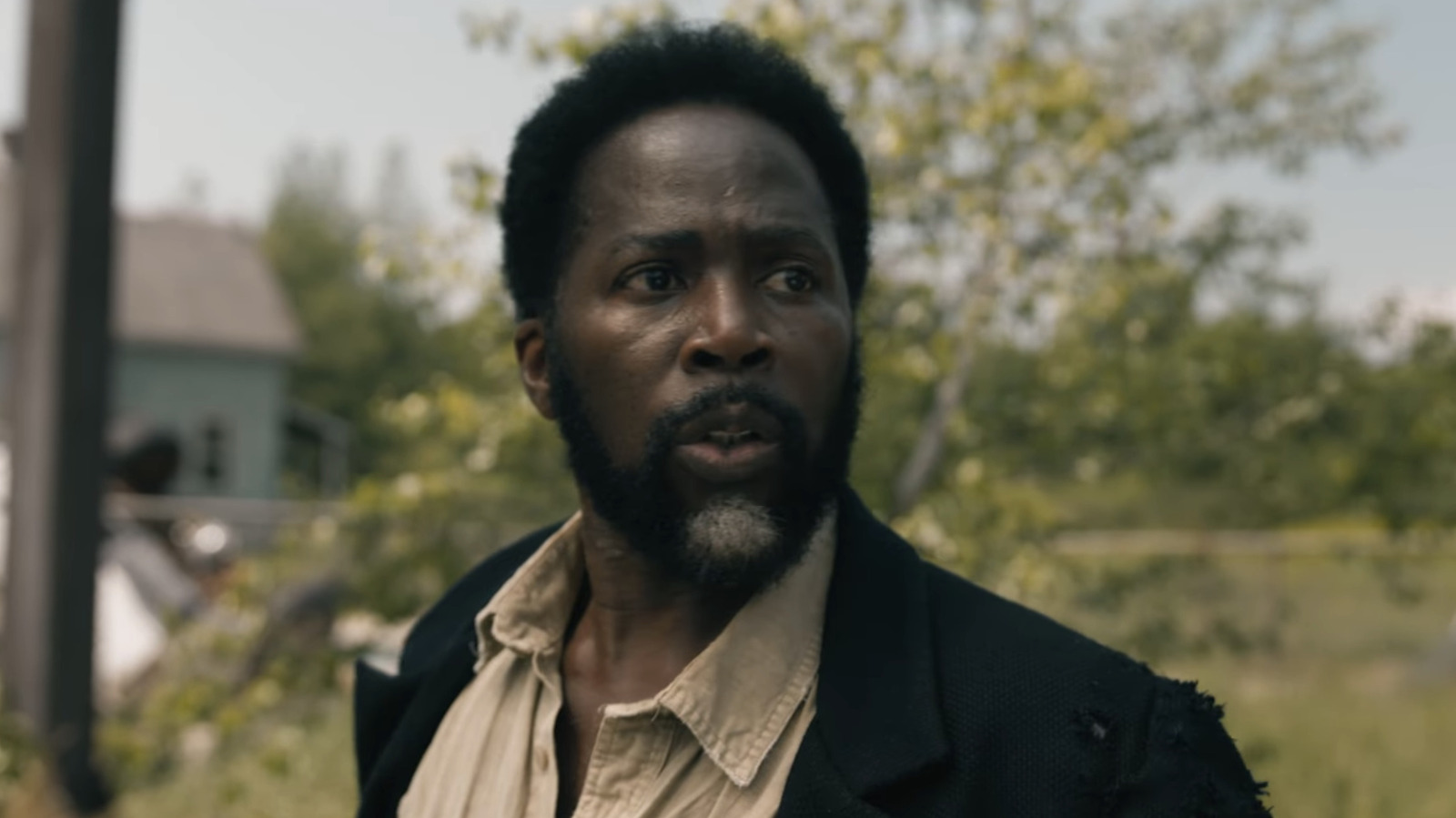It’s a testament to Rachel Kondo and Justin Marks’ talent for establishing tone that while Shogun takes place in a world about which the average viewer knows very little, there’s seldom any doubt in the audiences’ mind with regard to what’s at stake and how we should feel about it.
Take the opening scenes from Shogun Season 1 Episode 4, for example.
A messenger hurries through a snowy village carrying an urgent missive for Lord Omi (whom we haven’t seen since he butted heads with Blackthorne in the show’s pilot episode).
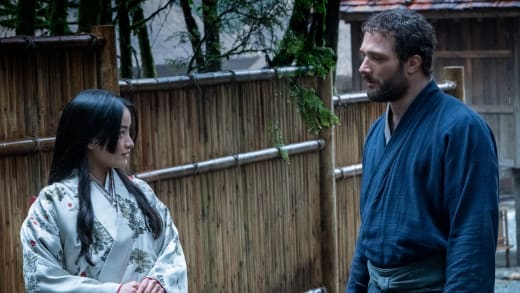
Most viewers will be unable to read the lettering on the message or the sign in the town square, but the scene that follows is a familiar one:
The peasants scurry to prepare for the arrival of a couple of bigwigs, and the local lord beams with anticipation for the opportunity to impress his superiors.
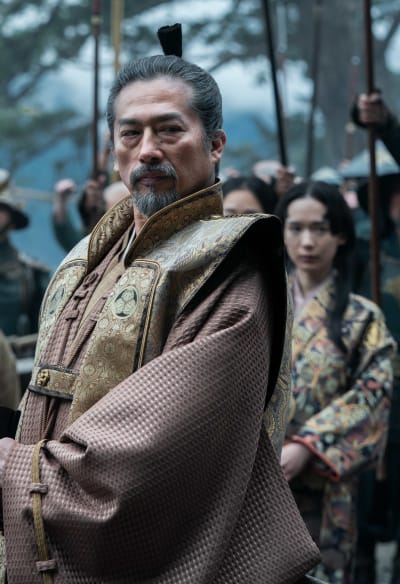
Similarly, the title of hatamoto and the mores of feudal Japan might be unfamiliar to many viewers, but rock bottom is a universal concept, and we recognize Fuji’s despair when we see it.
So while we might be just now learning about the customs that have cost her her son and husband and are now bringing about her degradation, we understand the depth of her suffering on an innate level.
And we realize that such pain could well make her a danger to those around her or instill her with profound compassion and empathy.
Ordered to serve as Blackthorne’s consort, Fuji begs permission to quit the clan and become a nun, but she’s denied by Lady Mariko.
Both women are without their husbands, but there’s an important difference in that society shares Mariko’s belief that Buntaro died with honor.
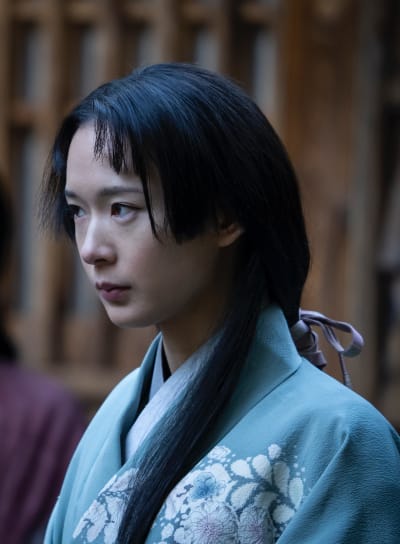
Fuji’s husband, conversely, was shamed into committing seppuku, meaning his wife receives none of the benefits that would normally be conferred upon a samurai’s widow.
Hence, Fuji’s reluctant agreement to serve as the Anjin’s consort for six months — her husband might have died dishonorably, but as a former member of the samurai caste, she retains enough power to bargain with Toranaga.
Similarly byzantine is the scheme that enables Toranaga to avoid seppuku of his own.
Being impeached by the Council of Regents would require him to take his own life, but since he resigned, the Council must now recruit a replacement before they can hand down a death sentence to their former peer.
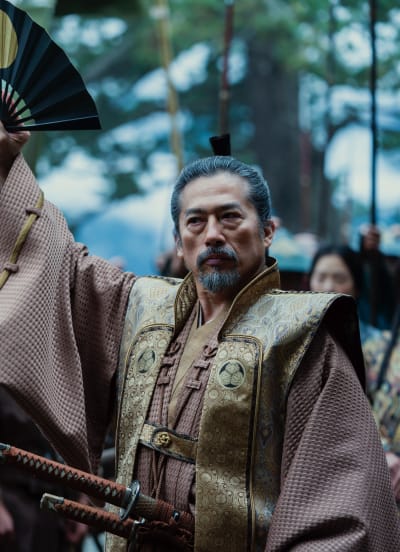
The writers of Shogun are faced with the difficult task of bringing a mostly Western and entirely 21st-century audience up to speed on a wide array of unfamiliar traditions and practices.
And the ability to do so without ever pandering or slowing down the action might be the series’ most impressive feat.
At this point, it’s become something of a cliche to compare this show to TV’s last great feudal epic, Game of Thrones, and certainly, Shogun is sufficiently innovative and distinct that it suffers no risk of being overshadowed by the swords and lords dramas that preceded it.
But since so few series have attempted storytelling on this scale, it’s hard not to think of Westeros when Toranaga addresses a massive gathering of Yabushige’s samurai.
Like GoT, Shogun wisely balances the gravitas with moments of levity, and the look on Yabushige’s face when Toranaga peaces out on more urgent business might be the show’s funniest moment thus far.
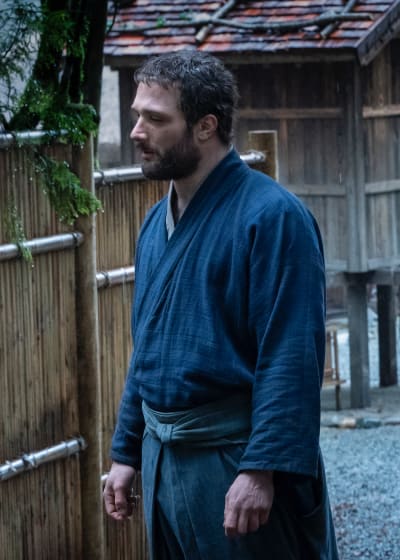
Although it’s rivaled a few minutes later by Blackthorne’s declaration that he doesn’t want any “generous cuckoos.”
Yes, the Anjin is perturbed by the news that his men have been relocated, his ship is no longer his, and despite his fancy new home and title, his deal with Toranaga is not as even as he’d believed.
Like the James Clavell novel on which its based, the series Shogun gradually shifts its focus slightly away from Blackthorne’s fish-out-of-water tale and expands its scope in order to encompass the vast power struggle that’s torn apart the marooned Brit’s new home.
But the Anjin remains an important figure in this story, and Cosmo Jarvis’ hilariously manic confusion remains a reliable source of comic relief.
Both the show and the actor are able to pivot back to a more serious tone as needed, and Blackthorne’s heartbreak at learning that he’s once again a prisoner is palpable.
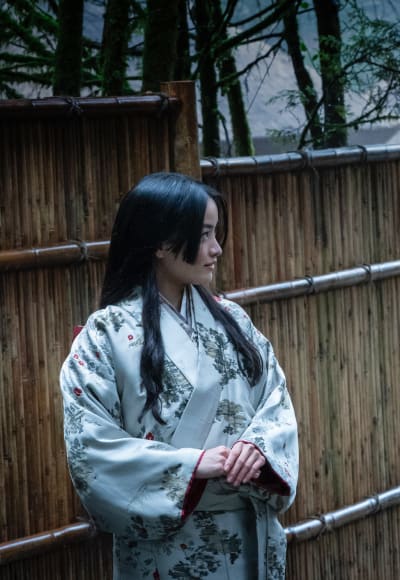
Yabushige’s relationship with the Lord of Kanto is no less complex, and he’s got plenty of frustrations to vent:
His nephew has yet to root out the spy who squealed about Blackthorne’s ship, and Ishido is sure to think that he’s fully in league with Toranaga.
Spotting an opportunity to redeem himself, Omi proposes a solution — wait for Toranaga’s impeachment and gift the ship and its weapons to Ishido.
Mariko continues her efforts to assist Blackthorne in understanding the culture of duty, honor, and sacrifice in which he now finds himself.
Perhaps no moment better encapsulates the spirit of this show than the one in which she explains Eastern ideas about mindfulness and self-discipline before gifting him one of his own guns.
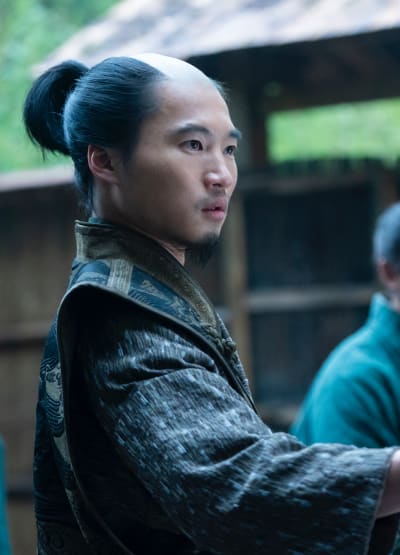
It doesn’t get much more Western than that!
Not surprisingly, Omi isn’t thrilled by the notion of Blackthorne being heavily armed, and the conflict between the two men offers Fuji her first opportunity to demonstrate her loyalty to the Anjin.
Finding that his lack of infantry experience makes it difficult to sing for his supper, Blackthorne changes tactics and impresses Yabushige — no mean feat! — with the accuracy of his cannons.
The barbarian’s cannons…they’re unlike anything I’ve seen. Enough to shrivel Christian balls.
Yabushige
We’re then treated to that rarest of narrative gifts — simultaneous training montages! — as cannon camp gets underway while Mariko continues to tutor Blackthorne in the Japanese language.
And once again, we marvel at this show’s ability to make absolutely bonkers circumstances seem completely plausible.
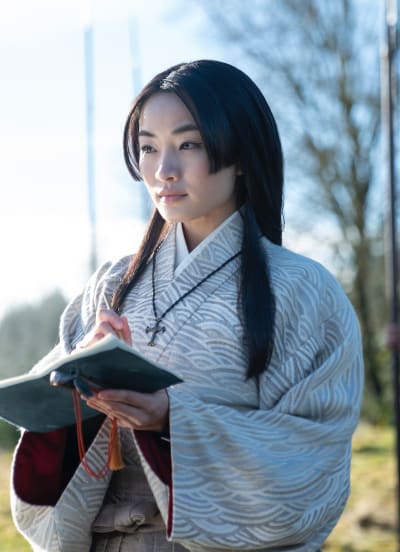
Of course, Mariko is also reading Anjin-san’s rutters, which are sure to complicate her dynamic with her (potential) new boo even further.
Are we jumping the gun in shipping (pun intended) these two?
Maybe. But in the midst of yet another philosophically charged debate, the earth literally starts shaking, and then there’s a random sex scene, and cannons start going off.
You don’t need to be an expert in subtextual semiotics and Freudian psychology!
Of course, nothing is random on Shogun — a series that might be more economical in its use of time than any series on TV — so we shouldn’t be surprised when the seemingly random sex sets the stage for Omi’s wife to emerge as a sort of Lady Macbeth.
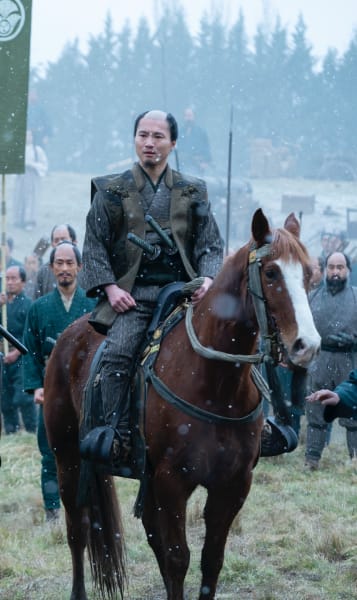
Just when we were beginning to think that this would be a relatively nonviolent episode, cannon camp is interrupted by the arrival of Jozen, who’s leading a pack of Lord Ishido’s men.
It’s not often that we have reason to fault this show’s wildly intricate plotting, but was it strange to anyone else that Yabushige declared himself an ally of Ishido’s within earshot of, like, 100 people, many of them Toranaga’s men?
The stakes couldn’t be higher for Yabushige, who’s now as reliant on Blackthorne’s artillery as Toranaga!
He knows that if Jozen is unimpressed by cannons, he’ll be performing his own abdominal surgery in Osaka. Nagakado is understandably less than thrilled by the extent of Yabushige’s self-interest.
So after a brief hiccup, we’re right back to praising the deftness with which this series interweaves countless plot threads.
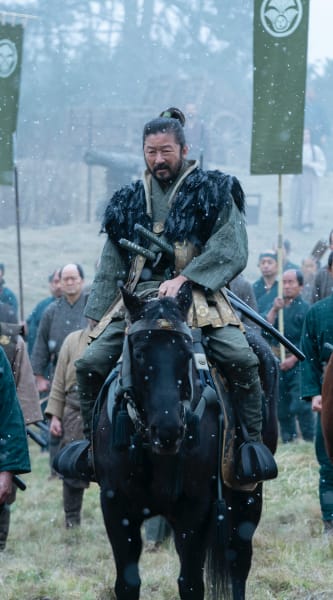
Speaking of the symbolic power of large weapons, Blackthorne is now a big Fuji fan, and he wishes to make amends for his earlier rudeness.
And how better to reward her use of guns to display loyalty than with a gun?
She seems displeased at first but then reciprocates the gesture with the gift of her father’s swords.
I can’t be consort to a man without swords.
Fuji
The exchange of weapons to solidify a cross-cultural bond is followed by some more of the show’s unexpectedly wry humor as Blackthorne chokes down his first bites of natto.
It’s possible that no scene thus far has so effectively demonstrated Shogun’s strengths and encapsulated its core themes.
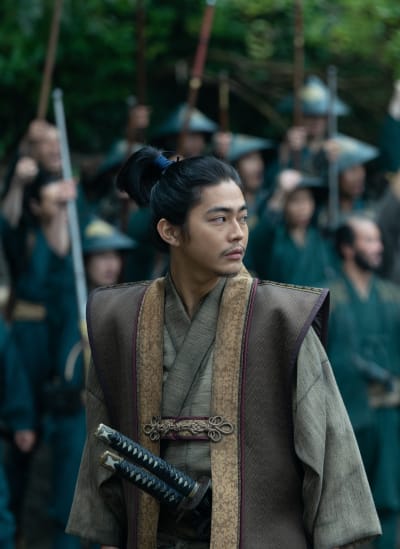
From that heartwarming scene, we return to the threat of violence looming over this episode like a dark cloud.
Nagakado sees the arrival of Jozen as a chance to prove his worth, and when his voice brightens as he hatches a plan to become a big shot, we’re reminded of AJ Soprano in all the worst ways.
A scene in which Mariko and Blackthorne unite over their painful pasts was inevitable, and while the midnight bath scene was loaded with sentiment, the bond between these two was in some ways more satisfying when it was less explicit.
That said, we appreciate the show skipping the prelude and getting down to business with the next scene. After all, it’s not like we didn’t know where this relationship was headed.
Of course, it wouldn’t be TV’s most twisty show if Mariko didn’t throw Blackthorne a morning-after curveball by pretending to be ignorant of the previous night’s pillowing.
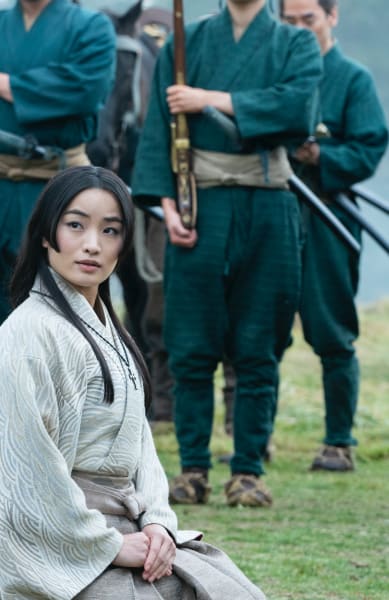
But you had to know an episode of Shogun couldn’t end with a whimsical little romantic misunderstanding.
When Yabushige declares Blackthorne’s swords a bad omen, we know he’s not wrong, and sure enough, moments later, Nagakado gets too big for his britches and decimates Jozen’s ranks with cannon fire in the show’s goriest scene yet.
Then he decimates Jozen with a sword.
It’s a shocking act of provocation, alright. And it’s a violation of the samurai code that’s certain to lead to more bloodshed.
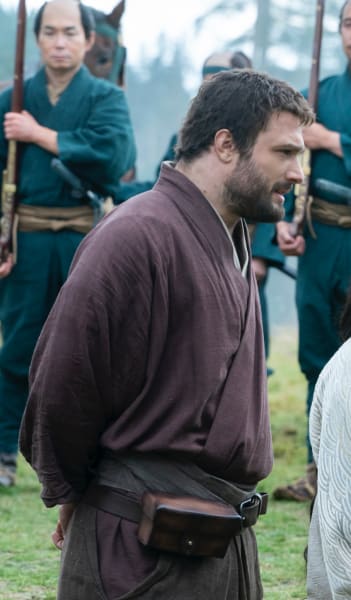
Once again, this show demonstrates a willingness to cut to the chase (no pun intended) that’s all too rare on TV these days.
We all knew we were headed for a Toranaga vs. Ishido war, and now, the conflict has arrived.
It’s impossible to imagine that the intensity could be ratcheted up any further, but as fans of Shogun’s source material know, the best is yet to come.
What do you think, TV fanatics? Are you as excited as we are for the clash of the daimyos?
Hit the comments section below to share your thoughts.
Edit Delete
Tyler Johnson is an Associate Editor for TV Fanatic and the other Mediavine O&O sites. In his spare time, he enjoys reading, cooking, and, of course, watching TV. You can Follow him on X and email him here at TV Fanatic.






